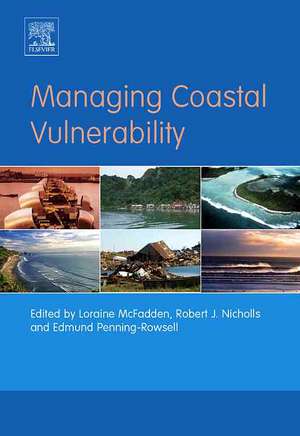Managing Coastal Vulnerability
Autor Loraine Mcfadden, Robert Nicholls, Edmund Penning–rowsellen Limba Engleză Hardback – 22 noi 2006
An international audience of academics, researchers, students and policy advisors in geography, economics, sociology, and environmental science will benefit from the material presented in Managing Coastal Vulnerability.
*Breaks down primary concepts of coastal vulnerability
*Addresses coastal vulnerability around the world Ebro Delta (Spain), the crumbling cliffs of Corton Village/Suffolk (UK), and tsunami-worn Phuket (Thailand/Indian Ocean) to name a few
*Establishes a framework for discussion about global locations and sustaining resilience of coastal areas
Preț: 796.36 lei
Preț vechi: 1034.24 lei
-23% Nou
Puncte Express: 1195
Preț estimativ în valută:
152.38€ • 159.10$ • 126.12£
152.38€ • 159.10$ • 126.12£
Carte tipărită la comandă
Livrare economică 04-18 aprilie
Preluare comenzi: 021 569.72.76
Specificații
ISBN-13: 9780080447032
ISBN-10: 0080447031
Pagini: 284
Dimensiuni: 166 x 240 x 22 mm
Greutate: 0.46 kg
Editura: Emerald Publishing
ISBN-10: 0080447031
Pagini: 284
Dimensiuni: 166 x 240 x 22 mm
Greutate: 0.46 kg
Editura: Emerald Publishing
Public țintă
This book will appeal to an international audience, of academics and researchers, policy advisors and students, in the fields of geography (including planning), sociology, economics and environmental science.Cuprins
ACKNOWLEDGEMENTS
LIST OF FIGURES
LIST OF TABLES
Chapter 1Setting the parameters: a framework for developing cross-cutting perspectives of vulnerability for coastal zone management
Chapter 2Vulnerability analysis: a useful concept for coastal management?
Chapter 3More or less than words? Vulnerability as discourse
Chapter 4The natural resilience of coastal systems: primary concepts
Chapter 5Integrating knowledge for assessing coastal vulnerability to climate change
Chapter 6A note on the vulnerability of deltaic coasts. Application to the Ebro Delta
Chapter 7Local communities under threat: managed realignment at Corton Village, Suffolk
Chapter 8The Indian Ocean tsunami: local resilience in Phuket
Chapter 9Vulnerability of the New York City Metropolitan Area to coastal hazards, including sea-level rise – inferences for urban coastal risk management and adaptation policies
Chapter 10Promoting sustainable resilience in coastal Andhra Pradesh
Chapter 11Reducing the vulnerability of natural coastal systems – a UK perspective
Chapter 12Promoting sustainability on vulnerable island coasts: a case study of the smaller Pacific Islands
Chapter 13Managing coastal vulnerability and climate change: a national to global perspective
Chapter 14Vulnerability and beyond
LIST OF FIGURES
LIST OF TABLES
Chapter 1Setting the parameters: a framework for developing cross-cutting perspectives of vulnerability for coastal zone management
Chapter 2Vulnerability analysis: a useful concept for coastal management?
Chapter 3More or less than words? Vulnerability as discourse
Chapter 4The natural resilience of coastal systems: primary concepts
Chapter 5Integrating knowledge for assessing coastal vulnerability to climate change
Chapter 6A note on the vulnerability of deltaic coasts. Application to the Ebro Delta
Chapter 7Local communities under threat: managed realignment at Corton Village, Suffolk
Chapter 8The Indian Ocean tsunami: local resilience in Phuket
Chapter 9Vulnerability of the New York City Metropolitan Area to coastal hazards, including sea-level rise – inferences for urban coastal risk management and adaptation policies
Chapter 10Promoting sustainable resilience in coastal Andhra Pradesh
Chapter 11Reducing the vulnerability of natural coastal systems – a UK perspective
Chapter 12Promoting sustainability on vulnerable island coasts: a case study of the smaller Pacific Islands
Chapter 13Managing coastal vulnerability and climate change: a national to global perspective
Chapter 14Vulnerability and beyond
Recenzii
"...timely in context...the book expands exactly on those two concepts, “Vulnerability and Management”, which have also been identified as the guiding framework questions in the global LOICZ research project for the next decade. The authors provide a substantial contribution to the LOICZ objective...The book is particularly valuable because its perspectives are truly global in nature, encompassing different views from the developed world as well as from developing economies."
Hartwig Kremer, CEO LOICZ IPO, Germany
Hartwig Kremer, CEO LOICZ IPO, Germany










